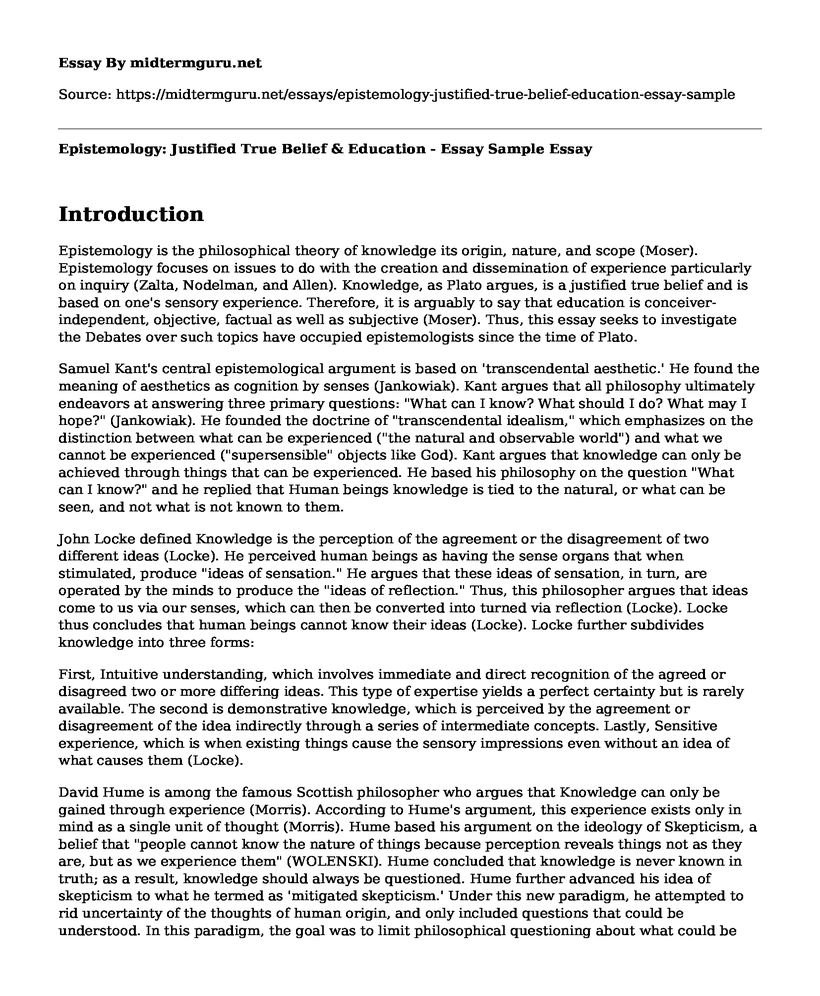Introduction
Epistemology is the philosophical theory of knowledge its origin, nature, and scope (Moser). Epistemology focuses on issues to do with the creation and dissemination of experience particularly on inquiry (Zalta, Nodelman, and Allen). Knowledge, as Plato argues, is a justified true belief and is based on one's sensory experience. Therefore, it is arguably to say that education is conceiver-independent, objective, factual as well as subjective (Moser). Thus, this essay seeks to investigate the Debates over such topics have occupied epistemologists since the time of Plato.
Samuel Kant's central epistemological argument is based on 'transcendental aesthetic.' He found the meaning of aesthetics as cognition by senses (Jankowiak). Kant argues that all philosophy ultimately endeavors at answering three primary questions: "What can I know? What should I do? What may I hope?" (Jankowiak). He founded the doctrine of "transcendental idealism," which emphasizes on the distinction between what can be experienced ("the natural and observable world") and what we cannot be experienced ("supersensible" objects like God). Kant argues that knowledge can only be achieved through things that can be experienced. He based his philosophy on the question "What can I know?" and he replied that Human beings knowledge is tied to the natural, or what can be seen, and not what is not known to them.
John Locke defined Knowledge is the perception of the agreement or the disagreement of two different ideas (Locke). He perceived human beings as having the sense organs that when stimulated, produce "ideas of sensation." He argues that these ideas of sensation, in turn, are operated by the minds to produce the "ideas of reflection." Thus, this philosopher argues that ideas come to us via our senses, which can then be converted into turned via reflection (Locke). Locke thus concludes that human beings cannot know their ideas (Locke). Locke further subdivides knowledge into three forms:
First, Intuitive understanding, which involves immediate and direct recognition of the agreed or disagreed two or more differing ideas. This type of expertise yields a perfect certainty but is rarely available. The second is demonstrative knowledge, which is perceived by the agreement or disagreement of the idea indirectly through a series of intermediate concepts. Lastly, Sensitive experience, which is when existing things cause the sensory impressions even without an idea of what causes them (Locke).
David Hume is among the famous Scottish philosopher who argues that Knowledge can only be gained through experience (Morris). According to Hume's argument, this experience exists only in mind as a single unit of thought (Morris). Hume based his argument on the ideology of Skepticism, a belief that "people cannot know the nature of things because perception reveals things not as they are, but as we experience them" (WOLENSKI). Hume concluded that knowledge is never known in truth; as a result, knowledge should always be questioned. Hume further advanced his idea of skepticism to what he termed as 'mitigated skepticism.' Under this new paradigm, he attempted to rid uncertainty of the thoughts of human origin, and only included questions that could be understood. In this paradigm, the goal was to limit philosophical questioning about what could be comprehended.Therefore, Hume argument concludes that knowledge is based on experience and that everything is known and learned through experience; however, nothing is indeed ever known. He believed, along with the fact that knowledge is only gained through experience, that a "person's experiences are nothing more than the contents of his or her consciousness." (Morris).
Conclusion
In conclusion, epistemology is the theory of knowledge. Knowledge it is self has many definitions as evidenced through the discussion of the above philosophers. Indeed, philosophy can be simple or complex while knowledge can be as simple as intuitive knowledge, which is a straight forward argument of what can be seen and is known. Thus, "that knowledge is based on experience, so everything that is known is learned through experience, but nothing is ever truly known."
Works Cited
Jankowiak, Tim. "Kant, Immanuel." Internet Encyclopedia of Philosophy (n.d). <https://www.iep.utm.edu/kantview/>.
Locke, John. The Works of John Locke in Nine Volumes. 12. Vol. 1. London: Rivington, 1824. 5 5 2019. <<https://oll.libertyfund.org/titles/761>>.
Morris, William Edward. "Hume's Conclusion." An International Journal for Philosophy in the Analytic Tradition 99.1 (2000): 89-110. document. 5 5 2019. <https://www.jstor.org/stable/4321046>.
Moser, Paul K. "Epistemology." Encyclopedia of Library and Information Sciences (2010). document.
WOLENSKI, JAN. "THE HISTORY OF EPISTEMOLOGY." ILKKA NIINILUOTO, MATTI SINTONEN, JAN WOLEN-SKI. HANDBOOK OF EPISTEMOLOGY. Springer Science+Business Media Dordrecht, 2004.
Zalta, Edward N, et al. "Epistemology." Standard Encyclopedia of Philosophy (2005): 1- 1. <https://plato.stanford.edu/entries/epistemology/>.
Cite this page
Epistemology: Justified True Belief & Education - Essay Sample. (2023, Jan 11). Retrieved from https://midtermguru.com/essays/epistemology-justified-true-belief-education-essay-sample
If you are the original author of this essay and no longer wish to have it published on the midtermguru.com website, please click below to request its removal:
- The Coefficient of Kinetic Friction Between a Block and an Include Plane
- Paper Sample: Intuition in Maths and the Role That It Plays in This Field
- Essay on Bulk Heterojunction Scheme
- Speech in Support of Parents Spanking Their Children - Essay Sample
- Paradox of Inquiry - Paper Example
- The Debate Over Rearing Children: The Pros and Cons of the Cry It Out Method - Essay Sample
- My Journey to Becoming a Doctor: An Observership at a Community Hospital - Essay Sample







